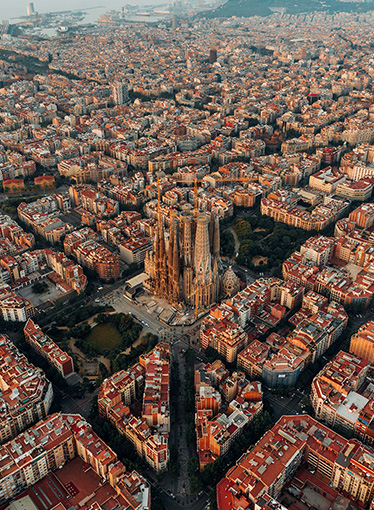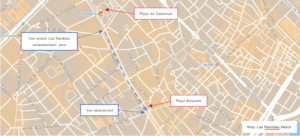Evacuations from High-Risk Locations Call +44 (0)1202 308810 or Contact Us →

Terror Attacks in Barcelona and Related Security Risks
18 Aug 2017
On 17 August 2017, a vehicle attack occurred on the Las Ramblas strip in Barcelona, killing 13 people and injuring approximately 100 people, with Islamic State taking responsibility for the attack. On 18 August, five attackers drove into a group of people 120km south of Barcelona in the town Cambrils. The police responded by killing the attackers. A further six civilians and one policeman were also injured. A further incident occurred in Sant Just Desvern; however, the facts of this are unclear at this time.
Key Points
- On 17 August 2017, a vehicle attack occurred on the Las Ramblas strip in Barcelona, killing 13 people and injuring approximately 100 people, with Islamic State taking responsibility for the attack.
- On 18 August, five attackers drove into a group of people 120km south of Barcelona in the town Cambrils. The police responded by killing the attackers. A further six civilians and one policeman were also injured.
- A further incident occurred in Sant Just Desvern; however, the facts of this are unclear at this time.
Situational Summary
Terrorism: The Catalunya region of Spain has seen a series of terror-related incidents over the past week. With 13 dead, dozens more injured, and a number of arrests being made.
Las Ramblas
The van attack on 17 August began in the Plaça de Catalunya, located at the start of Las Ramblas, an area popular with tourists in Barcelona. The Fiat van targeted a crowd outside the Plaça de Catalunya metro station before heading down the boulevard of Las Ramblas for 500 metres. The driver then abandoned the vehicle at the foot of a mosaic by Joan Miro before fleeing on foot. So far two arrests have been made, one of whom rented the van, but police are reportedly still searching for the van driver. 13 people have been killed so far, and an estimated 100 injured.
Sant Just Desvern
A man was killed after a vehicle attempted to drive through a police roadblock in the town of Sant Just Desvern, on the outskirts of Barcelona, about two hours after the Las Ramblas attack. At present, it is unclear how he died, some reports suggest he was shot and killed by police, others that he died of non-police inflicted stab wounds. It is also unclear if he had any link to the earlier terror incident.
Cambrils.
A few hours after the attack in central Barcelona there were reports of gunfire in the Spanish town of Cambrils, 120km south of Spain’s second largest city. Another car had driven into civilians near the port injuring six people and a policeman, this time the vehicle was an Audi A3. In the attack, the attackers’ car overturned. The attackers were fired upon by the police and killed. The police then carried out a series of controlled explosions of what they later believe to have been fake bomb belts. Police say the situation in Cambrils is now under control. At present, it remains unconfirmed whether the two attacks are linked. The Islamic State have claimed the attack in Barcelona through their news agency.
Solace Global Comment
This attack marks the ninth vehicle attack by Islamic extremists since the attack on the Promenade des Anglais in Nice on 14 July 2016 and falls firmly into the pattern of recent terror attacks in Europe. The lack of sophisticated weaponry follows the trend in low technology terror attacks. The locations of these attacks are strategic; Las Ramblas is one of the most popular tourist destinations in Europe with people from all over the world visiting each year. The location and time of the attack ensured a high number of people would be vulnerable. In January 2016, Islamic State made a video threatening attacks in Spain specifically. It has also been reported that the CIA may have warned Spanish authorities of an imminent attack on Spanish territory, although this remains unconfirmed at present. So far, up to eight attackers have been involved in the two attacks, indicating a significant presence of terror networks in Spain and a more coordinated effort in comparison to recent lone-wolf attacks across Europe. An explosion at a house in Alcanar on 16 August 2017 is reported to be linked to these attacks. The investigation into the incident is likely to continue for some time.
The attack at Las Ramblas is one of the more fatal vehicle attacks to have occurred over the last year. The Berlin Christmas market attack on 19 December 2016, resulted in 12 killed and over 50 injured. The attack in Nice remains the most fatal with 86 killed and over 400 people injured. Attacks of this nature are incredibly difficult to prevent, detect, or counter. In comparison to the United Kingdom and France, Spain has experienced relatively few terror attacks in recent years. The most significant of which last occurred in March 2004 when Madrid trains were bombed. 192 people were killed in the attack and an estimated 2000 were injured.

SECURITY ADVICE
TerrorismLowWhile the incidents in Barcelona and the Catalunya region represent a terror attack with a severe impact, the long-term underlying risk of terrorism for most of Europe remains low.
If caught in a terror situation, travellers are advised to RUN – HIDE – TELL – FIGHT – TREAT.
RUN – If in a location where gunfire or explosions are heard, leave the area or building by any safe and available exit immediately.
HIDE – If unable to run away, find suitable cover or barricade yourself in a room. Remember to silence your phone and turn vibrate off.
TELL – Inform emergency services or alert someone who is able to do it for you. Once police arrive, comply with their instructions and do not make any sudden movements.
FIGHT – As a last resort, if confronted with a gunman, it is recommended to fight back by using the element of surprise by shouting, screaming and running fast at the attacker. If sheltered with others, convince them to do the same and rush the attacker all at once. Ensure the person entering the shelter is the attacker and not law enforcement.
TREAT – For potentially fatal wounds, the earlier a victim is treated, increases the likelihood they will survive the incident. This is potentially difficult to manage as armed police responding to a terror attack have to prioritise eliminating the threat first. Paramedics are generally only allowed onto the scene once the police have secured the area and removed the threat. This can result in significant delays of professional assistance to those who need it most. A person may not have first aid training; however, they may be able to assist in stopping excessive bleeding whilst emergency services are on their way. Although rushing to assist someone is admirable, whether there is a remaining terrorism threat should also be considered.
If in a location where a terror incident has occurred it is important to notify others of your safety. This can be done by the usual means but also through social media, who routinely enable safety checks during disasters where users can notify others that they are safe. Travellers are advised to contact their local Consulate in Barcelona for assistance on the location of family and friends or use a hotline set up specifically for the incident on +34 900 400 012.
Local authorities have advised people to stay inside and stay away from the Las Ramblas area of the city. If you are in the immediate area you should take care and follow the advice of the local security authorities. Press reports suggest that some public transport, particularly the metro, has been affected and that police barricades remain in effect around Plaça de Catalunya.
Travellers should maintain situational awareness, particularly in congested areas. Security measures are expected to be increased at high profile locations and densely populated areas across the country. Police are likely to be conducting raids and security searches across the country; it is important that travellers should follow police instruction immediately. Solace Global advises enhanced security measures in Spain are not required for travellers at present. However, the use of travel tracking, supported by a live intelligence feed, will serve as an added measure to inform travellers early of developing incidents. Catalan officials have announced three days of mourning after the attack. A minuteâs silence is due to be held on Friday 18 August 2017.